In an alarming escalation of cyber threats, the UK has witnessed a sharp increase in TV Licence-related scams, with over 6,000 cases reported in just two weeks.
This startling revelation comes from Action Fraud, the UK’s national reporting centre for fraud and cybercrime, which has seen a surge in fraudulent emails masquerading as official communication from TV Licensing.
This nefarious activity not only undermines the security of personal information but also poses significant financial risks to the public.

In response to these incidents, Action Fraud has taken assertive measures, resulting in the shutdown of 268,000 counterfeit websites, a testament to the severity of the situation.
Here’s what to look out for, if you get a suspicious e-mail or letter.
Understanding The TV Licence
First introduced in 1946 (it was £2 back then), the TV licence fee is a mandatory payment for all UK households watching the BBC live, recorded, or on BBC iPlayer – and it is used to fund the BBC.
Furthermore, if you watch any live TV from any broadcaster (even an international one) – you also need to pay the fee (See our full guide on whether you need to pay the TV Licence fee or not).
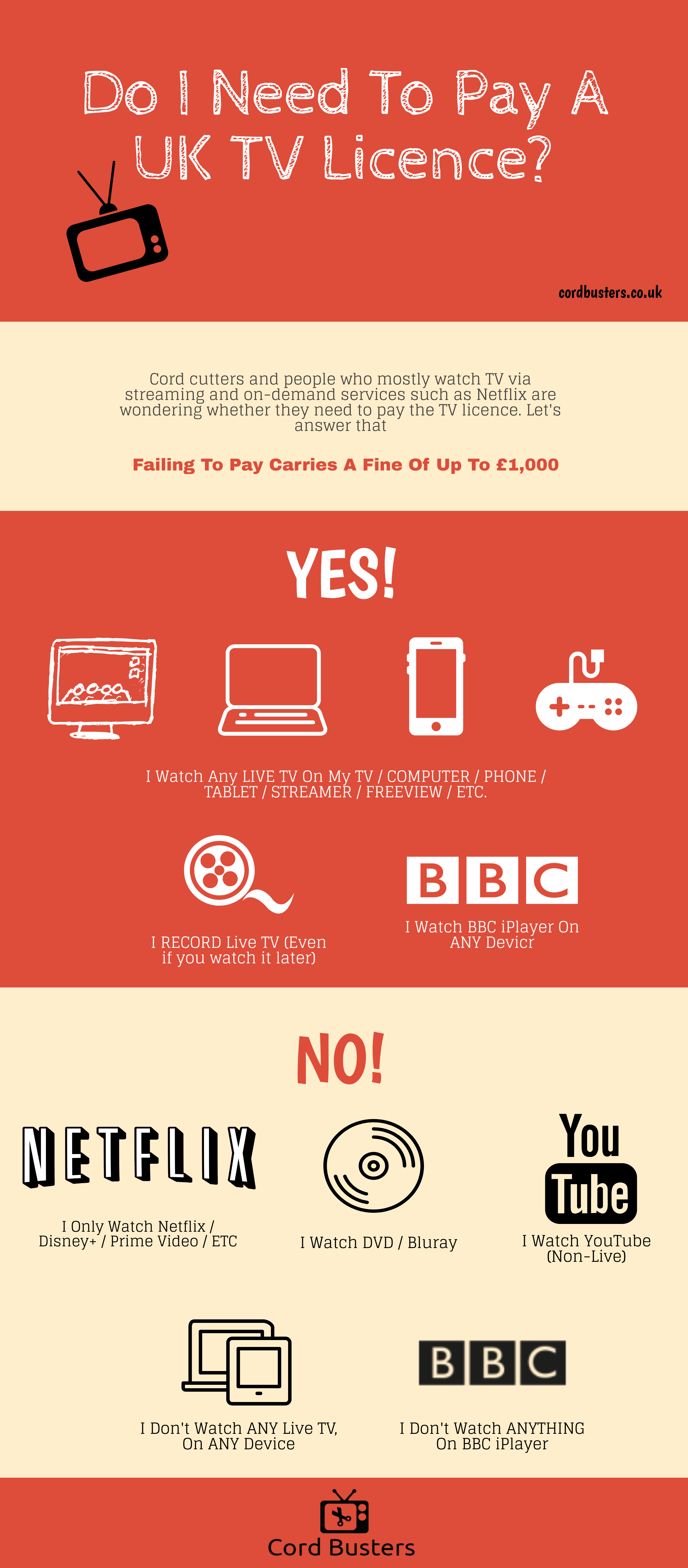
Failure to pay the TV licence fee is a criminal offence and can lead to a fine of £1,000 – and even, in rare cases, jail time – if you fail to pay the fee and the fine in court.
Currently, the TV Licence fee stands at £159 (following a two-year freeze), but is set to go up to £169.50/year in April 2024.
As part of the BBC’s strategy in enforcing the TV licence fee (which is part of its job), it sends warning letters. 36 million enforcement letters were sent to UK households in the 2022-2023 financial year.
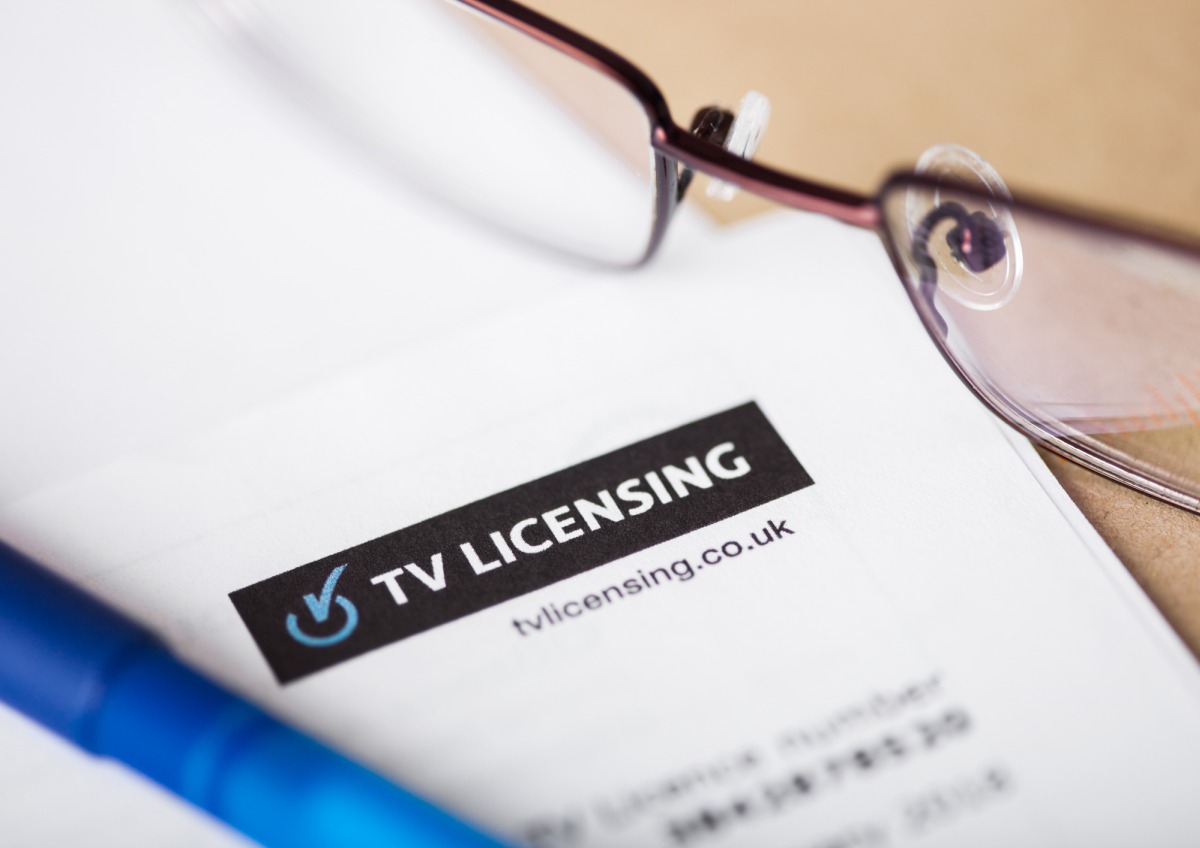
Managed by Capita on behalf of the BBC, these letters are part of a broader enforcement strategy, which includes visits from enforcement officers and potential legal actions.
Scammers, however, have long been using this genuine correspondence as a way to trick people into either giving out their details – or even actual money.
The Anatomy Of A TV Licence Scam
Scam emails pretending to come from TV Licensing have been going around for years – but recently, Action Fraud received over 6,000 reports in just two weeks, of particular e-mails doing the rounds.
The scam email, striking in its convincing appearance, implores recipients to “update your details to stay licensed,” preying on the legal anxieties surrounding TV Licence compliance.
The fake email fabricates a scenario where a payment could not be processed, providing a faux licence number and insisting on the urgency of updating bank details.
The email reads:
“We were unable to take a payment for your Licence number: 3295105, as your bank has declined the Direct Debit payment request.
“This may have happened because your bank details have changed. To make sure you stay licensed, please provide new Direct Debit details now. Once you have done that, you can also update any other details if required.”
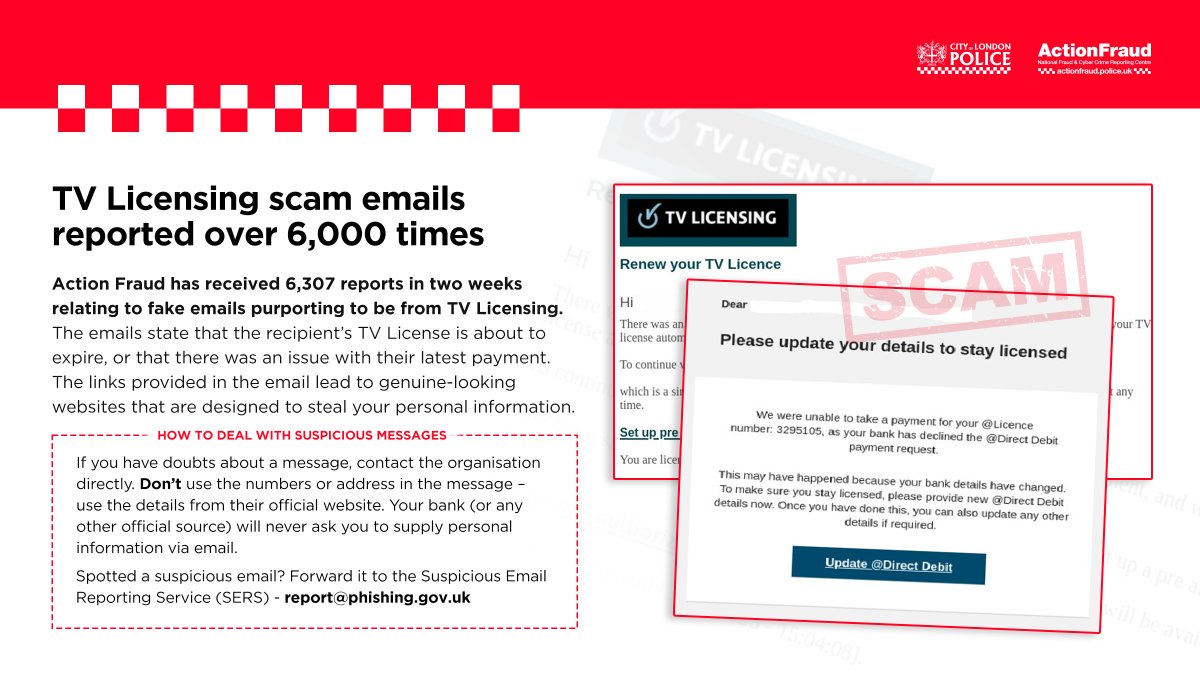
This communication is designed to create a sense of urgency, prompting the recipient to act swiftly and without scrutiny, a common tactic employed by cybercriminals.
Then – if you follow the link and give out your banking details – the fraudsters may end up with your money.
The sheer volume of reports – 6,307 in a fortnight – underscores the scale and effectiveness of this scam.
The fraudulent campaign has prompted a broad public awareness initiative, with Action Fraud advising against using any contact information provided in these emails and instead verifying through official channels.
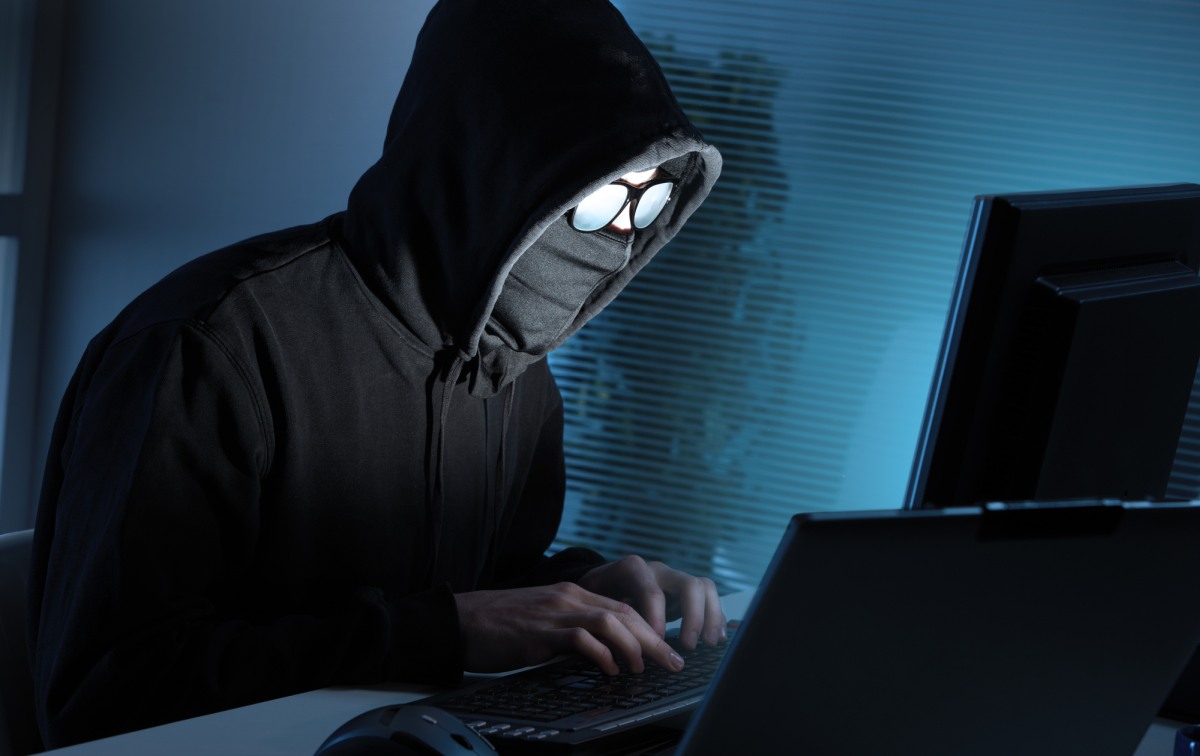
Action Fraud is also urging people to report suspicious emails to [email protected], saying that these reports have led to the removal of 268,000 scam sites.
Brits Hit With TV Licensing Scams
As always, social media is rife with people who were recently targeted by these types of TV Licensing e-mail scams.
Oh how I hate scammers. No my TV licence is not due for renewal, especially as it comes from a German email address. Another one reported to @actionfrauduk. @tvlicensing pic.twitter.com/UhEfu87HYs
— Warren Whyte (@WarrenWhyteUK) January 16, 2024
One scam e-mail, pretending to come from the BBC, even offered a “discount” on the TV licence:
Scam email I got this morning. There’s no way the BBC will give you a discount on your TV license. 🙄 pic.twitter.com/THDHsLDRJL
— Tracy Watt 🏴 (@watt_tracy74) January 8, 2024
Sometimes the e-mail pretends to be coming from… BBC iPlayer:
@BBCiPlayer scam doing the rounds anyway the site is free as long as you have a TV license but is an easy scam to spot pic.twitter.com/GYfeoJ9lTo
— Liam Craig Evans (@ITSLNE) December 20, 2023
These types of scams are, unfortunately, quite common. A TV Licensing spokesperson previously told Cord Busters:
“We take the protection of our customers extremely seriously and work with groups across the UK to raise awareness of how people can avoid scams.
“If anyone is suspicious or doubtful about whether correspondence is genuine, we’d encourage them to call us or check our website where there is guidance on how to spot them.”
How To Spot TV Licensing Email Scams
To avoid getting scammed, there are a few things you should check when you receive any correspondence relating to the TV Licence fee.
1. Know What Real TV Licensing Emails Look Like
Real emails from TV Licensing will usually have your name, part of your postcode, or your licence number on them. If an email calls you “Customer”, “Dear Sir”, or doesn’t have your proper details, be careful.
True TV Licensing emails come from specific addresses like [email protected] or [email protected]. But even if it looks right, be careful, because scammers can fake email addresses.
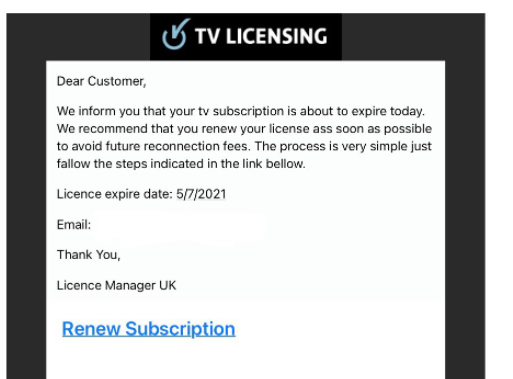
2. How to Tell if It’s a Scam Email
Scammers hide their real email address. If you check the sender and it’s a personal email address, that’s a sign it’s likely a scam.
Scam emails might rush you to pay because of a “problem” or offer a refund or a cheaper licence. They might also show a licence number that isn’t yours.
Check for bad spelling or weird links, too. Real emails from TV Licensing won’t have these mistakes.
If an email talks about a refund and then asks for your bank details, that’s not right.
The only websites you should use for TV Licensing are tvlicensing.co.uk and spp.tvlicensing.co.uk.
3. What to Do if You Get a Scam Email
Got a dodgy email? Send it to [email protected]. This helps the security experts check it out.
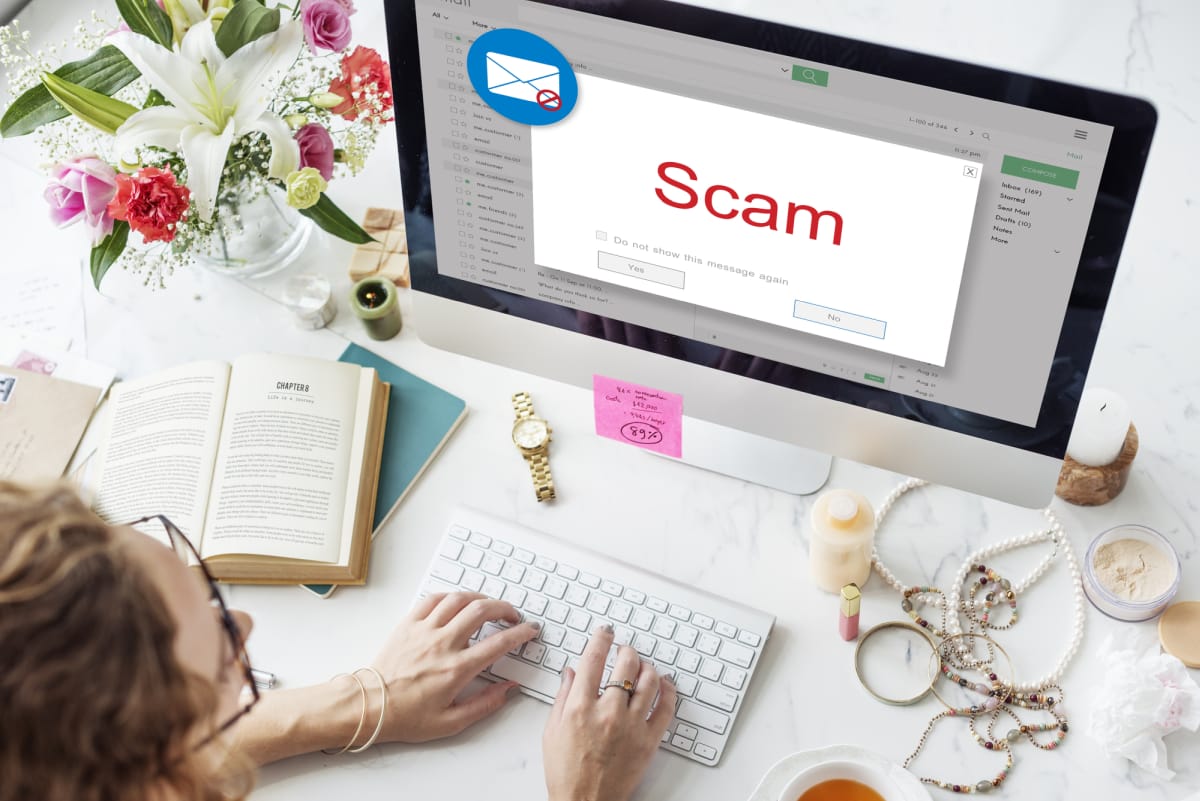
If you’ve accidentally given out personal info, call Action Fraud on 0300 123 2040. If you’ve given bank details, tell your bank right away.
If you get a scam text about your TV Licence, screenshot it and send it to [email protected].
Paying Your TV Licence the Safe Way
The best tip is simple: Don’t click on any links in these types of emails. Go straight to the official TV Licensing website yourself by typing it into your browser: https://www.tvlicensing.co.uk.
If you’re unsure about an email, just check your account on the official site to see if everything’s okay.
And if you want to pay or talk to someone, call the TV Licence folks directly at 0300 790 0368 for Direct Debit, or 0300 555 0286 for Payment Card customers.
For more guides, news and updates on TV in the UK, Subscribe to our free newsletter.
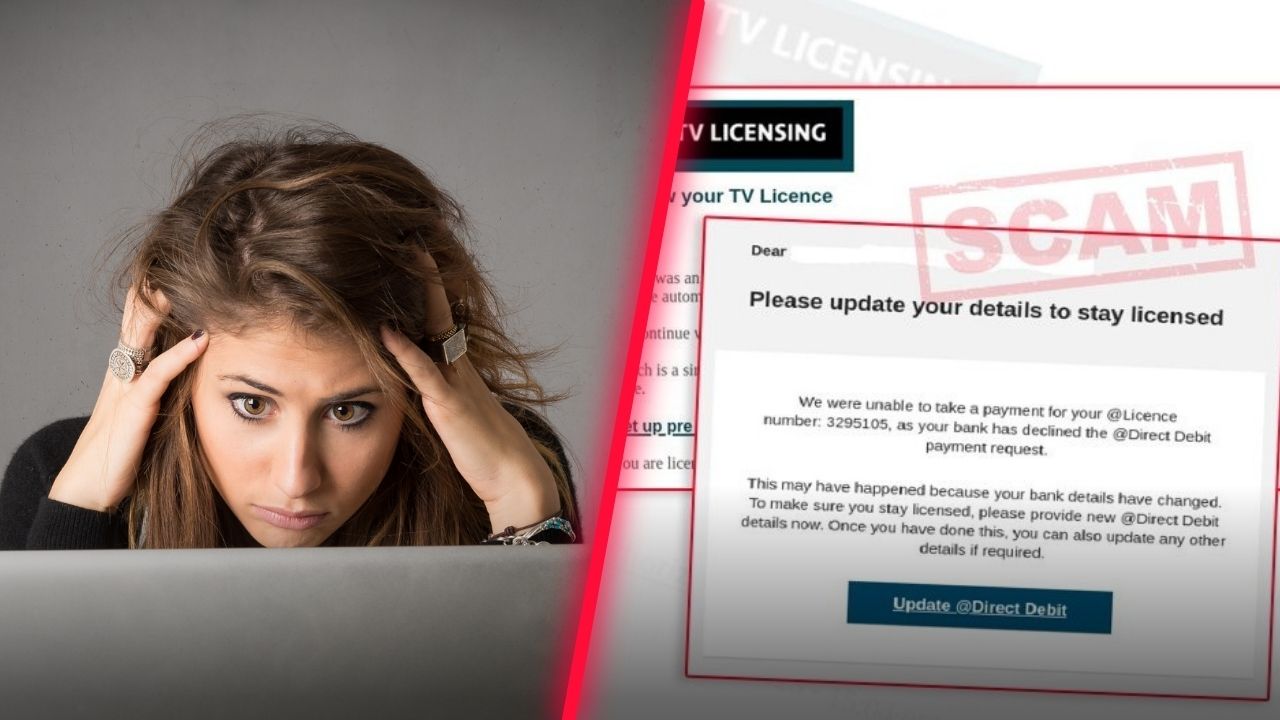
How do we know if this is entrapment – an alternative company could be secretly working on behalf of the BBC to trap those individuals whos email is not registered with the BBC?
It might sound a little far-fetched, but why send TV inspectors out to random addresses to check if they have a valid TV licence, when you can trap those evading TV licence by those registering their email addresses to the BBC.
It seems to me that any scammer (whether they work on behalf of the BBC or not), is capable of any cover-up.